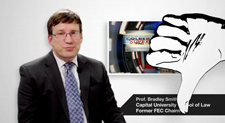Can you get in trouble with the law — or at least a government agency’s unlimited regulatory power — for peacefully telling the truth?
You can, despite the protections articulated in the First Amendment and the greater respect sometimes accorded to freedom of speech than to other constitutionally protected rights.
It is possible because when they assault speech, government officials claim to be opposed not to the right to speak freely but to something else. They say they’re combating lung cancer, the influence of money on politics, or the unequal distribution of information to investors.
This summer, Reed Hastings of Netflix committed the sin of boasting on Facebook that monthly viewing of Nexvids “exceeded one billion hours for the first time ever in June.” Sounds innocent enough.
Come December, though, and the Securities and Exchange Commission has threatened to bring civil charges against Netflix for allegedly violating “public disclosure rules.” SEC Regulation FD requires public companies to make “full and fair disclosure” of “material” information that is not already public.
The SEC still thinks that 244,000 Facebook subscribers don’t fully and fairly constitute the public, but the communication cannot by any reasonable, modern construal be a case of offering “insider information.” How much more “outside” from the back rooms of a corporation can you get than Facebook?
The absurdity, here, lies in the SEC’s rules and its interpretations of those rules — and in the blind, confused, bankrupt way bureaucracies, which don’t go bust as the companies they oversee can, enforce their rules.
That is why Bernie Madoff slipped through the SEC’s fingers for years, while Netflix finds itself in hot water for a Facebook posting.
This is Common Sense. I’m Paul Jacob.



